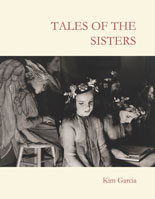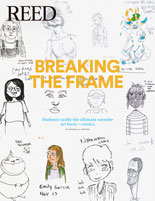
IRIS login | Reed College home Volume 96, No. 1: March 2017
Reediana
Tales of the Sisters, DRONE, and The Brighter House (Sow’s Ear Poetry Chapbooks, 2016; the Backwaters Press, 2016; White Wine Press, 2016)
By Kim Garcia ’85
Reviewed by Katie Pelletier ’03



Kim Garcia won an array of poetry awards this year resulting in three publications: a chapbook and two longer works, Tales of the Sisters, Drone, and The Brighter House. Each is a collection of lyric poetry that cuts close to the bone. With language that is understated yet riveting, Kim’s subjects range from family to fairy tales to war.
DRONE takes on modern warfare in poems that inhabit a variety of perspectives and personas. “It explores the human, animal, personal, and domestic aspects of the wars being fought by the US for incomprehensible reasons with indefinable outcomes.” The poems in this collection, which won the 2015 Backwaters Prze, explore the wartime lives of soldiers, military families, prisoners, and immigrants.
Tales of the Sisters won the 2015 Sow’s Ear Chapbook Competition. A tightly constructed collection exploring family, violence, loss, and myth-making, the poems probe difficult modern subjects using elements of fairy tales. There are woods and wolves and rumpelstilstskin, but also walruses, blood transfusions and pamphlets left with young girls by Baptists. Like any good tale, the work is gripping and unsparing.
The Brighter House shares many poems with Tales of the Sisters, newly arranged among additional poems, they resonate in novel ways. The camera pans more widely: poems probing childhood wounds are side-by-side expectant motherhood and the terrific mix of grace and tragedy in daily life. For example “The Dead in Summer” opens to baby sparrows in their nest under an airconditioner: “These are the grandchildren/ of that first mistake, not much/ to look at —featherless sinew, toothpick/ bones, then an ugly molt.” Again, language that can be soft is undercut by lurking violence, past and present. In “Shifting Light/ Columbia Gorge,” a poem that braids several strands of time, the speaker, who has previously been picking unripened berries “planning a pie, sweetening/ what was sour,” tells us “It’s a sin to let time sugar the past.” Kim’s aesthetic stands up under this maxim: never sugared, never sentimental.

LATEST COMMENTS
steve-jobs-1976 I knew Steve Jobs when he was on the second floor of Quincy. (Fall...
Utnapishtim - 2 weeks ago
Prof. Mason Drukman [political science 1964–70] This is gold, pure gold. God bless, Prof. Drukman.
puredog - 1 month ago
virginia-davis-1965 Such a good friend & compatriot in the day of Satyricon...
czarchasm - 4 months ago
John Peara Baba 1990 John died of a broken heart from losing his mom and then his...
kodachrome - 7 months ago
Carol Sawyer 1962 Who wrote this obit? I'm writing something about Carol Sawyer...
MsLaurie Pepper - 8 months ago
William W. Wissman MAT 1969 ...and THREE sisters. Sabra, the oldest, Mary, the middle, and...
riclf - 10 months ago